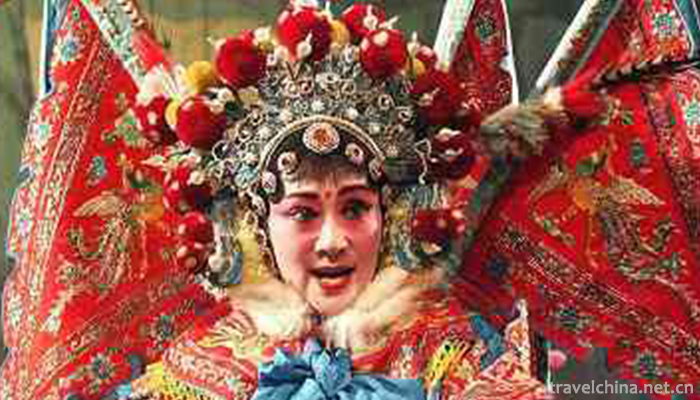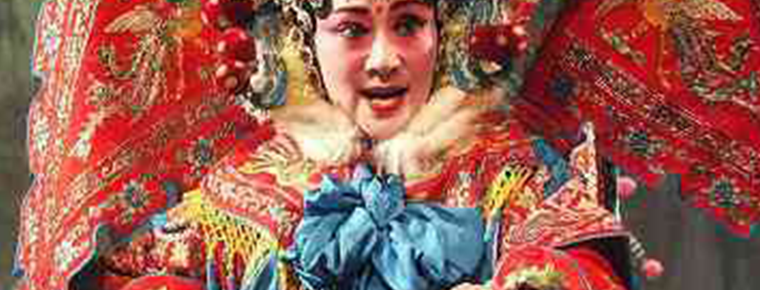Huaibei Bangzi Opera
Huaibei Bangzi Opera
Huaibei Bangzi Opera originally named Shahe Diao, also known as Shahe Bangzi, Anhui Bangzi Opera, and Henan Henan Henan Opera belong to a different genre, is popular in Anhui Province along the Huaibei area of traditional opera. Local people commonly known as "Gaobang", generally referred to as Bangzi opera.
Huaibei Bangzi's singing is lively, graceful and lively. It can express not only pleasant mood, but also generous and vigorous atmosphere. It has a strong local color. The empty words such as which, ah, roar, wow, ho, ah, etc. are lined in the cavity, which can decorate the singing cavity and produce the effects of full lyrics, clever pronunciation and witty tune.
On May 23, 2011, the Huaibei Bangzi Opera jointly declared by Suzhou and Fuyang, Anhui Province, was listed in the third batch of national intangible cultural heritage list with the approval of the State Council.
historical origin
During the Qing and Jiaqing Dynasties, Yang Tan, who sang Bangzi Opera in Shangqiu, Henan Province, came to the northern part of Anhui to sing and set up classes to pass on art. Influenced by local customs and folk art, the singing tune is different from the original Bangzi in Shangqiu, Henan Province, regardless of male and female actors, regardless of slate style, long and short sentences, and when singing, it is lined with many empty words, such as, ah, haw, haw, roar, bah, whine, which is formed by artists absorbing local minor changes, called "Shahe Tune". The aria of Shahe tune can be divided into 10 kinds, such as adagio, running water, 28, flying board and stomping. However, when singing, actors can change their minds and feelings according to the scenarios prescribed by the script. Henan Bangzi, also known as Shahe Bangzi, is used to attack the festival with jujube. Shahe Bangzi further developed, not only in the singing of clever words, melodious, but also pay attention to stealing words, flash board, flexible and changeable. Red-faced singing, absorbing the local drum calligraphy artists'singing methods, such as half-talking and half-singing, first voicing and then playing, dozens of lines after singing and dragging the tune to finish, not limited by 7 words, 10 words of lyrics. String accompaniment, using only a Beijing Hu (soft bow).
After the founding of the People's Republic of China, Bangzi in Shahe developed rapidly. In the 1950s, Fuyang, Suxian and Huainan established 18 professional theatre troupes at the district, county and municipal levels, which were named Huaibei Bangzi. In 1960, the Huaibei Bangzi Theatre Troupe of Anhui Province was established, and its development entered its heyday. All professional theatre troupes are staffed with directors. More than 700 traditional plays have been excavated and more than 500 performances have been performed regularly. Such as "Weishui River" (also known as "Wen Wang's Visit to Xian"), "Fire Son Capital" (also known as "Var Zidu"), and "Var Su Qin" (also known as "Hong Changfu") and so on. In Huaibei area, people in the field can sing some red-faced and Black-faced Bangzi operas.
Huaibei Bangzi has a certain blood relationship with Henan Opera, Shangdang Bangzi, Pu Opera and Laiwu Bangzi. It is mainly prevalent in some areas of northern Anhui, Eastern Henan and Northern Jiangsu. At its peak, almost all counties and counties had professional theatre troupes. Early and influential theatre troupes were established, mainly the turn-over troupe and the dawn troupe during the Anti-Japanese War.
Inheritance and protection
The Bangzi Opera in Suzhou has a brilliant time in history. In the 1950s, Zhang Fulan, an old artist, reported and performed in Jinjing. In 1987, the provincial TV station produced six series of TV dramas from the historical costume drama "Chu Gong Hate" created and performed by the Bangzi Opera Troupe in Suzhou. In October 1998, the large-scale modern drama "Towering Trees" created and performed by the Bangzi Theatre Troupe attracted great attention from all walks of life. In 1999, it won the provincial "Five-one" project award. However, in the following ten years, influenced by the great environment of the development of opera, many theatre troupes had almost no opera to perform. In order to survive, the performers mostly performed singing and dancing outside, and some young actors left one after another, which led to the lack of talent cultivation. Although the living environment of opera has improved since 2006, it still faces some difficulties. However, among the three Bangzi troupes in Suzhou, there are bottlenecks in their development to varying degrees.
Keeping close to the theme of the times, let the development of Bangzi Opera in Suzhou glow with new vitality. In addition to the large-scale contemporary anti-corruption drama "Peace is a blessing", the city Bangzi troupe also created a true story reflecting grass-roots cadres struggling to die for the party: "Shixiang Party Spirit - Ke Zenghua", as well as "Rural Mayor kneeling" and "Village Official Niu Xiaole" and other small plays with strong flavor of life, which were highly praised both inside and outside the industry. Especially the drama "Shixiang Party Spirit-Ke Zenghua" successfully opened up the external performance market. From May 26 to June 23, 2013, it toured Beijing and Anhui provinces with more than 400,000 audiences. It created a new commercial performance mode in the field of foreign cultural exchanges, and the Bangzi Theatre Group of Suzhou enjoyed a high reputation.
In 2013 and 2014, Bangzi Opera held two consecutive sessions of the city's opera stage, giving full play to the artistic function of teaching and entertainment, Gaotai education, in the form of popular performance, each show has thousands of people come to watch.


-
2.Wa Palace Scenic Area Handan City
Wa Palace, located in Zhonghuangshan Mountain, Shexian County, Handan City, Hebei Province, covers an area of 5 square kilometers.
Time 2018-11-24 -
3.Royal Prime Ministers Palace
Huangcheng Xiangfu (National AAAAA Scenic Area) is located in Beiliu Town, Yangcheng County, Jincheng City, Shanxi Province.
Time 2018-11-24 -
4.Huaqing Pool Scenic Area
Tang Huaqing Palace is another palace for feudal emperors in Tang Dynasty. Later also known as "Huaqing Pool", located in Lintong District, Xi'an City, Shaanxi Province.
Time 2018-12-12 -
5.Luofu Mountain Scenic Area
Luofu Mountain Scenic Area is a national AAAAA level scenic area. It is located on the Dongjiang River of Guangdong Province, 35 kilometers away from Boluo County, Huizhou City
Time 2018-12-12 -
6.Nangong Scenic Spot
Located in Wangzou Town, Fengtai District, southwestern suburb of Beijing, Nangong Village, the village where the scenic spot is located, enjoys the reputation of "China's first geothermal villag
Time 2018-12-27 -
7.Jindian Scenic Spot
Kunming Golden Palace Scenic Spot, also known as Tongwa Temple, is made of brass and shines in the sunshine, reflecting the golden brilliance of Cuigou Youlin
Time 2019-01-22 -
8.The Great Wall Site of Qin Dynasty in Ningxia
The site of the Great Wall of King Zhao of Qin Dynasty was built in the twenty-fifth year of King Zhaoxiang of Qin Dynasty (272 BC). It was built to defend against the invasion of the Huns in the sout
Time 2019-02-07 -
9.Haha Opera
Haha Opera, also known as Liuzi Opera and Drinking Opera, is a local opera originated from the folk in Hebei Province. It is the first national intangible cultural heritage
Time 2019-05-02 -
10.Xinchang tune
Xinchang tune is one of the ancient opera tunes, also known as "falling out of tune", "Shaoxing high-key" and "Xinchang high-key". With Xinchang as the center, it has spr
Time 2019-07-06 -
11.Da Yu
Yu, surnamed Si, is famous for his life. (Yu Yu is the name). History is called Da Yu and Emperor Yu. Xia Hou Shi Chieftain Xia Dynasty The founding king. Yu is Yellow Emperor Great grandson, Zhuan Gr
Time 2019-09-07 -
12.Neijiang in the period of the Republic of China
The 1911 Revolution ended the rule of Qing Dynasty in Neijiang City. In the 24th year of the Republic of China (1935), Sichuan government was unified, and the districts, cities and counties of Neijiang City were divided into the second (Zizhong, Neijiang, Ziyang, Jianyang,
Time 2020-12-16